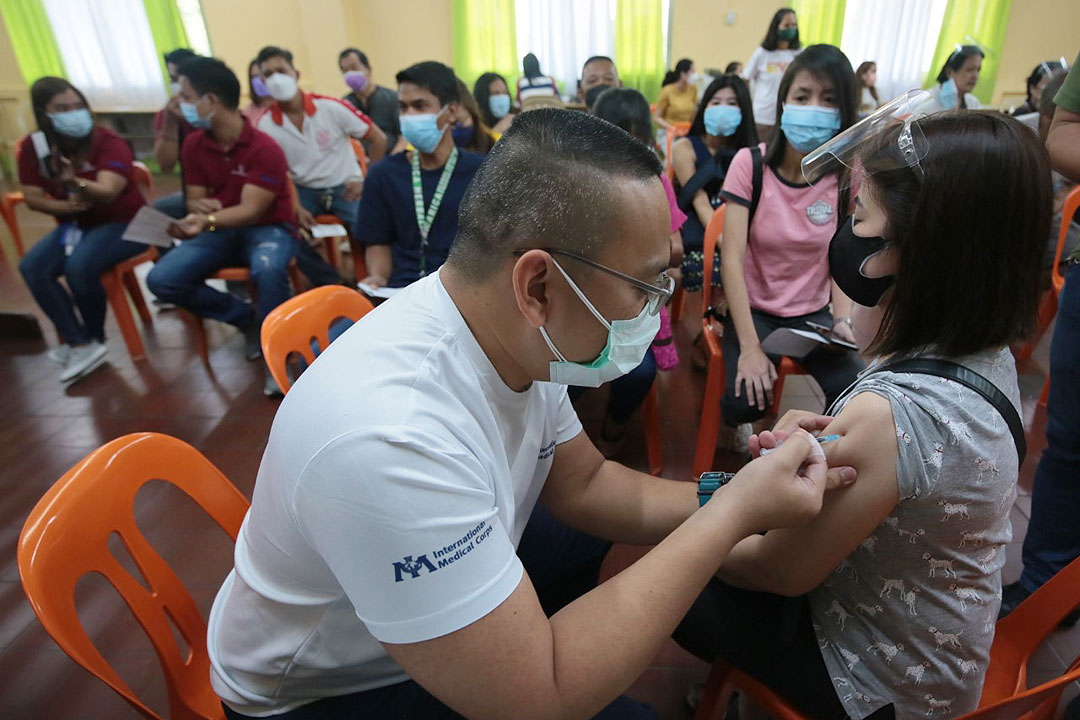Alert level up in 3 provinces around Metro Manila

THE PHILIPPINE government on Tuesday raised the coronavirus alert in three provinces adjacent to the capital region as the country confronts threats from the more transmissible Omicron variant.
Bulacan, Rizal, and Cavite, which are part of the so-called greater Manila area, would be placed under Alert Level 3 from Jan. 5 to 15 “due to a sharp increase of COVID-19 cases in the particular localities,” the presidential palace said, citing a resolution passed by an inter-agency task force.
The level 3 alert, up from level 2, means more mobility restrictions and lower operating capacity for some commercial establishments, among other limitations.
The recommendation was made by the pandemic task force’s data analytics group, it said.
Rizal and Cavite are part of the Calabarzon region in the southern and eastern sides of the National Capital Region, while Bulacan is on the northern border.
On Monday, the Calabarzon region posted more than 570 coronavirus infections, bringing its total to 500,173 with 5,815 deaths. The region, which produced 14.3% of the country’s 2020 gross domestic product, had 3,696 active cases as of Jan. 3.
Of the region’s total infections, 163,524 were from Cavite, which reported 270 cases on Monday. Rizal, meanwhile, logged 149 infections on Jan. 3, bringing its total to 105,560.
Bulacan in the Central Luzon region posted 185 cases on Monday, bringing its total to 105,524. The total number of cases in Central Luzon, which contributed 10.4% of the country’s economic output last year, hit 282,971 after it posted 275 infections on Jan. 3.
The country is battling a fresh surge in infections, which experts said could exhaust the country’s health system.
Authorities must focus on community-based interventions and proven virus containment measures to arrest the new wave of infections, the Coalition for People’s Right to Health (CPRH) said in a statement.
“With the pandemic entering its third year in the Philippines and across the world, those handling the response should have learned from the evidence in mitigating the spread of the virus,” it said in a statement.
FREE TESTING
The rights-based group composed of health advocates said that amid the spike in infections potentially spurred by the Omicron variant, “testing must finally be made free and accessible to all.”
It noted that the price ceiling for coronavirus tests remains expensive at P2,800 for public and P3,360 for private.
“Given that majority of testing laboratories are private, this further drives up the cost,” the CPRH said. “To make matters worse, in Dec. 2021, the Philippine Health Insurance Corporation reduced its coverage or subsidy for testing, with the benefit package for PCR testing reduced to P 800-2,800 from the former P901-3,409.”
“With 28 provinces still without a testing lab and an additional 3 without a public facility, the integral aspect of testing is still neither free nor accessible to all Filipinos,” it added.
Aksyon Demokratiko senatorial candidate Carl E. Balita, a registered nurse-midwife, said healthcare professionals in the Philippines continue to suffer from lack of job security and proper benefits.
“If not for the Omicron surge looming, many nurses faced non-renewal of their contracts,” he said at the Pandesal forum.
“There was an average of 30,000 nurses registered a year for the past 20 years, and there is no reason for the country to have scarcity of nurses, if only we give our Filipino nurses reasons to stay in the country,” he said.
The government should provide medical sector workers with free testing, Rizal District Representative Juan Fidel F. Nograles said, stressing that these frontliners should not be burdened with such added cost.
“It is just right for us to ensure that our modern-day heroes, our frontliners, do not have to worry about the expenses of being tested and even managing the disease in case they are infected,” he said in a statement on Tuesday.
He said the free testing should cover all workers in medical institutions, quarantine facilities, and pharmacists.
The Department of Budget and Management (DBM) said it has allocated funds for mass testing, recognizing that it is crucial for the country’s recovery.
“We have allotted P7.921 billion for COVID-19 Laboratory Work which includes the purchase of kits, and other equipment, transportation and trainings necessary for mass testing,” DBM Director U. Rolando Toledo told BusinessWorld in a Viber message.
He added that the Department of Interior and Local Government has a P250 million budget for contact tracing.
The CPRH also said that while vaccination is key to deterring the pandemic, “testing remains essential to detecting breakthrough infections.”
VACCINATION
It urged the government to empower communities with accessible health information and services to address vaccine hesitancy and the infectious disease’s social determinants.
Senators on Tuesday called for increased vaccination capacity, enhanced information drive, and stricter protocol implementation to support economic revival despite increasing COVID-19 cases.
“We should all be responsible enough to do our part in defeating the virus and saving the lives of our people, especially now that our economy continues to suffer a beating,” said Senator Panfilo M. Lacson, Sr., a presidential candidate, in a Viber message.
Senator Ana Theresia “Risa” Hontiveros-Baraquel, meanwhile, called on the Health department to increase vaccination capacity. “Let us not wait for the situation to worsen before we find a way to hasten our inoculation measures.”
She also noted the need to ramp up the information drive for booster doses and increase free testing.
Metro mayors on Tuesday signed a resolution for the passage of local laws that will restrict the movement of unvaccinated residents.
The resolution made by the capital region’s development authority is not legally effective if Metro mayors would not pass local ordinances, the Justice department said in a Viber message to reporters.
Justice Secretary Menardo I. Guevara said local legislative councils exercise police power delegated unto them by the local government code, which was enacted by Congress. “This delegated police power authorizes them to pass such ordinances as they shall deem to be for the welfare of their constituents.”
He said it is for the courts to determine whether the measure is oppressive and could violate the country’s charter. “Unless judicially restrained, however, these public health measures may actually be executed and enforced.”
The government is aiming to inject more coronavirus vaccines amid the threat of the Omicron variant, which has been driving surges worldwide.
The government earlier failed to reach its goal of fully vaccinating 54 million people by the end of 2021.
About 50.16 million people have been fully vaccinated against the coronavirus as of Jan. 3, data from the Health department showed. Almost two million booster shots have been injected.
A pandemic official earlier expressed confidence that the goal made last year would be achieved as early as this week. — Kyle Aristophere T. Atienza,Alyssa Nicole O. Tan, and Jaspearl Emerald G. Tan



